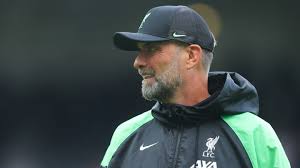Liverpool owner John W Henry was in attendance in August to watch the Reds play Chelsea. The announcement this week that Destiny Equity has taken a minority position in Liverpool effectively ends Fenway Sports Group’s long-running search for investment.

It’s been about a year since it was revealed that FSG had developed a sales brochure for any truly interested parties while also asking two large banks, Goldman Sachs and Morgan Stanley, to examine the runners and riders of organizations interested in investing in the project.
At the time, a cloud of uncertainty hung over Anfield as virtually every level of the club was plagued by questions. On the field, Jurgen Klopp’s Reds were struggling to keep pace in the Premier League having tailed off considerably from just a few months previous when they had flown so close to quadruple immortality.
Off the pitch, the decisions from sporting director Julian Ward and head of research Ian Graham to step down from their roles at the end of the campaign also painted a picture that all was not right behind the scenes at the AXA Centre, while Mike Gordon’s decision to move away from the day-to-day running of the club to scour the market for potential investors hinted that FSG’s exit strategy was now firmly in motion.
And while the news of New York-based Destiny’s arrival won’t quicken to pulse too much given the influx of their capital – understood to be somewhere between £80m and £160m – is to be used to reduce pandemic-related debts rather than fund an all-out assault in the January transfer market, it does at least reaffirm that FSG are continuing to look at their investment in Liverpool through the wider lens.
“Money in football is all about spending. I get that,” Klopp said on Friday about the deal. “I am part of it as well. In moments, I want to spend money as well.
“But in this moment in time, we should not forget, we built in recent years, we are now building a new stand which will improve, I’m not sure how that will happen, but improve the best atmosphere in the world anyway. Then we built another stand, the Main Stand. We built a training ground, we bought Melwood back.”
A cursory glance across the Premier League is evidence enough to suggest that FSG, for all their critics – plenty even-handed and some unfair – are ultimately the right custodians for Liverpool.
Manchester City, for all their Abu Dhabi state-backed success, have the small matter of 115 Premier League charges hanging over them indefinitely, while Todd Boehly’s frankly obscene bull-in-a-china-shop approach to transfers sees Chelsea officially bottom of the Premier League for points amassed since the start of 2023.
The use of Newcastle United as a vehicle for sportswashing from the Public Investment Fund of Saudi Arabia is also another unpalatable truth for Liverpool fans to baulk at, while the Glazer family at Manchester United are detested.
Reds fans also only have to look across Stanley Park to get a real glimpse at what poor ownership can do. The words ‘frying pan’ and ‘fire’ have been thrown around plenty since it became clear American firm 777 are looking to take Everton off Farhad Moshiri’s hands.
FSG’s low-risk, slow-burn approach is not everyone’s cup of tea, of course, and there are plenty of legitimate gripes for those in that particular camp. Like the decision to make £115m suddenly and dramatically available for Moises Caicedo in mid-August months after deciding the funds for a Jude Bellingham chase simply weren’t there because players like Alexis Mac Allister and Dominik Szoboszlai also needed to be recruited.

And yes, those who demand FSG relax their natural aversion to risk in the transfer market do have a firm point at times but when the major concern about your club’s owners is an overly methodical strategy for transfer spending, there can be few real complaints outside of social media noise. Ask supporters of Chelsea, United or Everton if they would swap right now?
So for all the potential pitfalls that lay in wait if the club was to be up for sale, bringing on Dynasty ultimately has no tangible impact for supporters just now, Instead, it is another block of additional stability and shores up the finances for a future that looks more exciting than it has for a while.
At a time when Liverpool are unbeaten in 19 games, dating back to April, and on a seven-match winning run with a new-look and thrilling young team under Klopp, it’s fair to suggest that the Reds are – to coin a phrase from their manager – ‘in a good moment’ just now. Their best, in fact, since the final week of the 21/22 campaign when quadruple immortality still remained in play.
“I know it is words when we say it is ‘year one’, but it feels like that,” Klopp says. “We don’t want to compare or think ‘how did they (previous team) do that?’ or whatever, we try to give this team a chance to create their own destiny.”
The addition of the Destiny dollar can only help on that front and the long-term landscape at Liverpool looks brighter and more clear than it has for quite some time.

